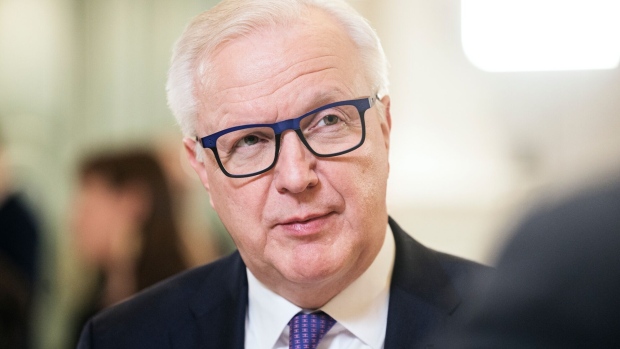Apr 16, 2024
ECB’s Rehn Says Geopolitics Pose Biggest Risk to Rate Cuts
, Bloomberg News

(Bloomberg) -- Slower inflation has opened the door for the European Central Bank to start lowering interest rates this summer, though geopolitics could still derail such plans, according to Governing Council member Olli Rehn.
If updates on the inflation outlook, underlying pressures and the strength of monetary-policy transmission increase confidence that the ECB’s 2% price goal is coming sustainably into view, borrowing costs could be cut at June’s policy meeting, Rehn said Tuesday in Helsinki.
But such a step also hinges on the situations in Ukraine and the Middle East not deteriorating. “This assumes there will be no further setbacks — for instance in the geopolitical situation and therefore in energy prices,” the Finnish official said.
The ECB left its deposit rate at a record-high 4% for a fifth meeting last week, while signaling that cooling inflation will soon allow it to commence cuts — an idea that was backed up Tuesday by Governing Council member Gabriel Makhlouf.
Lithuanian central-bank chief Gediminas Simkus said a day earlier that more than three reductions are possible this year, though some of his colleagues are more cautious.
The ECB’s monetary-policy path may diverge from that of the Federal Reserve, given the economies of the two continents are performing differently, Rehn told a press conference later Tuesday.
“There is, for the moment, divergence in the economic cycle and development between US and European economies, which means that naturally we may take different kinds of decisions in the coming period.”
Even so, given that the US has a “significant impact” on the real economy and financial markets, the ECB doesn’t make its decisions “in a vacuum,” Rehn said.
He also urged measures to improve euro-zone productivity, noting implications for inflation and the level of real interest rates over the medium term.
“Improving productivity doesn’t happen overnight,” he said. “This requires long-term economic policy that supports investments and strengthens companies’ opportunities for growth.”
--With assistance from Jennifer Duggan.
(Updates with Makhlouf, Rehn on US economy starting in fourth paragraph.)
©2024 Bloomberg L.P.






